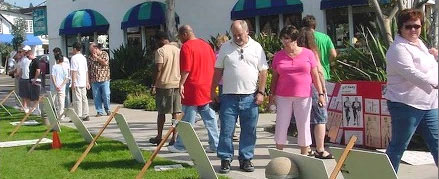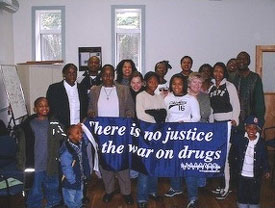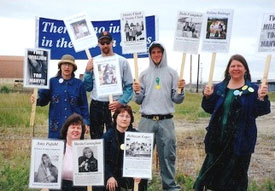 |

|
 |
Bottoms Up 2009More than a drinker's toast, 'Bottoms Up' is about the power of grassroots action, the wisdom of the majority, the ability to speak truth, lead and influence others. Bottoms Up is also a practical and growing manual for community activists, updated often with fresh organizing experiences. November Coalition staff traveled almost 30,000 miles in 2002 -- 2003, on a project called Journey for Justice, a series of scheduled events throughout the Northeast, East Coast and South. Face-to-face meetings in homes, churches, colleges and community centers were followed by recording the experience in the Coalition's online guidebook to community activism, Bottoms Up: A Guide to Grassroots Organizing.  Rally Against the Drug War, Laguna Beach, CA 2006 Available online at www.november.org/BottomsUp, Bottoms Up is useful for beginning and seasoned organizers who exercise First Amendment rights to speech, petition and assembly. This how-to manual covers topics such as: Organizing a Public Event or Private Meeting with Officials, Designing Flyers and Posters, Working with Others, Leading a Demonstration, Building a Relationship with the Media and Elected Officials. Also included is a generous sampling of artwork, press release examples, educational literature, studies and reports, graphs and displays to share with the public, meeting forms, and other resources for organizers of different levels of skill. Educational Supplies include banners, posters, brochures, full displays and periodicals.
Incarcerated people retain rights of speech and petition, if not assembly. Without question, people in prison may communicate freely with members of Congress, other public officials, and media about their circumstances. Loved ones outside may also contact officials to personally lobby for change. Around critical questions about criminal justice our imprisoned loved ones have answers we all need to hear. To help members do a good, effective, personal lobbying job for an incarcerated loved one or a sentencing issue, here are specific recommendations from a professional lobbyist that were first posted in Bottoms Up in 2001. Getting Your Message Through is Your Highest PriorityBy William D. McCollAs a professional lobbyist, I would like to make some suggestions about how to respond to an offensive letter from legislators, or help you as you begin communicating in letters and visits to your federal and state legislators. If your legislator has made you angry, and you respond in anger, you have taken their bait. An angry 'rant' in response, verbal or in writing, allows them to dismiss you. Your job is to make it extremely hard for them to dismiss you. Essentially, the reason for any contact with a legislator or a legislative staff should be to further your goal. When you write a letter, or visit your leaders, think carefully about the goal of your communication. Put yourself into a legislator's shoes and ask some basic questions of your goals. Would this communication have support from other constituents of this leader? Are there other people with the same issue and requests? If not, then perhaps your issue or request isn't reasonable, or something that has enough support to interest a legislator. One thing you will need to do is develop several lines of arguments. If you are talking to a conservative, your message is different than if you are talking to a liberal, or to a moderate or to a libertarian for that matter. Considering all you know about your legislator is important. You may have initial correspondence, or news quotes that reflect their opinions about your issue. If you 'strike-out' with a message, go back and consider why it failed. In light of the reasons why it failed, try to further communicate your position a better way. If you can't think of a better way to communicate your message, do not respond angrily. Let things calm down before you go back to visit, or write again. Give some thought to how you can successfully reestablish lines of communication. Whatever you do, the very first rule of lobbying (well at least my first rule) is that you never burn your bridges. Respect people, making the best argument to them; your message is the highest priority. It is more important than getting 'something off your chest.' Since September 11th, Americans have been told that they are at war, that they need to accept a reduction in their civil liberties, and that they must stand united. Anything that detracts from those goals, may appear divisive and will have the effect of placing us in the category of "the enemy." We must be extremely cautious in all of our actions and in our letters, but this does not mean that we stop lobbying visits and letters to our government's leaders. One thing that I've learned is to lower my expectations. There are a lot of people on all sides of every issue. You may need to accept that it might take years to demonstrate responsibility and win legislators over. Have others make your case for you or with you, enlisting family and friends to write letters on your behalf, or take them with you when you visit your leaders to illustrate you have support for your request or issue. Show them that you have a large (preferably responsible) and active constituency behind you. |

